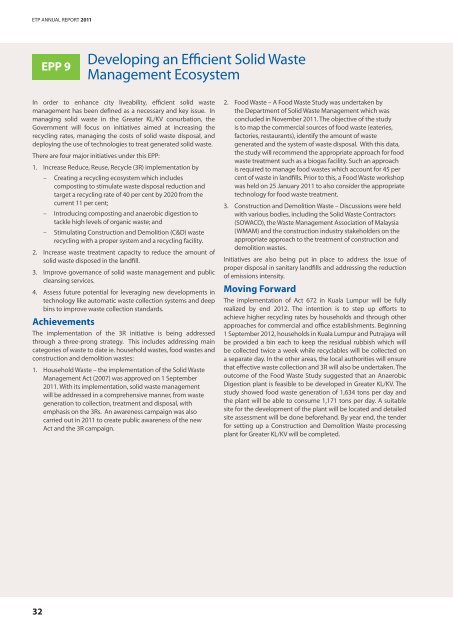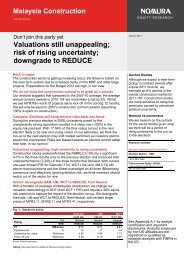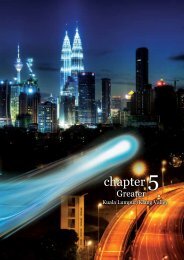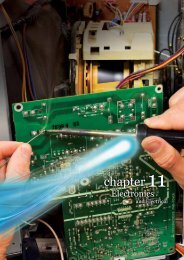Download PDF - ETP - Pemandu
Download PDF - ETP - Pemandu
Download PDF - ETP - Pemandu
You also want an ePaper? Increase the reach of your titles
YUMPU automatically turns print PDFs into web optimized ePapers that Google loves.
<strong>ETP</strong> ANNUAL REPORT 2011<br />
EPP 9<br />
Developing an Efficient Solid Waste<br />
Management Ecosystem<br />
In order to enhance city liveability, efficient solid waste 2. Food Waste – A Food Waste Study was undertaken by<br />
management has been defined as a necessary and key issue. In the Department of Solid Waste Management which was<br />
managing solid waste in the Greater KL/KV conurbation, the concluded in November 2011. The objective of the study<br />
Government will focus on initiatives aimed at increasing the is to map the commercial sources of food waste (eateries,<br />
recycling rates, managing the costs of solid waste disposal, and factories, restaurants), identify the amount of waste<br />
deploying the use of technologies to treat generated solid waste. generated and the system of waste disposal. With this data,<br />
There are four major initiatives under this EPP:<br />
1. Increase Reduce, Reuse, Recycle (3R) implementation by<br />
the study will recommend the appropriate approach for food<br />
waste treatment such as a biogas facility. Such an approach<br />
is required to manage food wastes which account for 45 per<br />
– Creating a recycling ecosystem which includes<br />
cent of waste in landfills. Prior to this, a Food Waste workshop<br />
composting to stimulate waste disposal reduction and<br />
was held on 25 January 2011 to also consider the appropriate<br />
target a recycling rate of 40 per cent by 2020 from the<br />
technology for food waste treatment.<br />
current 11 per cent;<br />
3. Construction and Demolition Waste – Discussions were held<br />
– Introducing composting and anaerobic digestion to<br />
with various bodies, including the Solid Waste Contractors<br />
tackle high levels of organic waste; and<br />
(SOWACO), the Waste Management Association of Malaysia<br />
– Stimulating Construction and Demolition (C&D) waste<br />
(WMAM) and the construction industry stakeholders on the<br />
recycling with a proper system and a recycling facility.<br />
appropriate approach to the treatment of construction and<br />
2. Increase waste treatment capacity to reduce the amount of<br />
demolition wastes.<br />
solid waste disposed in the landfill.<br />
Initiatives are also being put in place to address the issue of<br />
3.<br />
4.<br />
Improve governance of solid waste management and public<br />
cleansing services.<br />
Assess future potential for leveraging new developments in<br />
proper disposal in sanitary landfills and addressing the reduction<br />
of emissions intensity.<br />
Moving Forward<br />
technology like automatic waste collection systems and deep The implementation of Act 672 in Kuala Lumpur will be fully<br />
bins to improve waste collection standards.<br />
realized by end 2012. The intention is to step up efforts to<br />
Achievements<br />
achieve higher recycling rates by households and through other<br />
approaches for commercial and office establishments. Beginning<br />
The implementation of the 3R initiative is being addressed 1 September 2012, households in Kuala Lumpur and Putrajaya will<br />
through a three-prong strategy. This includes addressing main be provided a bin each to keep the residual rubbish which will<br />
categories of waste to date ie. household wastes, food wastes and be collected twice a week while recyclables will be collected on<br />
construction and demolition wastes:<br />
a separate day. In the other areas, the local authorities will ensure<br />
1. Household Waste – the implementation of the Solid Waste<br />
Management Act (2007) was approved on 1 September<br />
2011. With its implementation, solid waste management<br />
will be addressed in a comprehensive manner, from waste<br />
generation to collection, treatment and disposal, with<br />
emphasis on the 3Rs. An awareness campaign was also<br />
carried out in 2011 to create public awareness of the new<br />
Act and the 3R campaign.<br />
that effective waste collection and 3R will also be undertaken. The<br />
outcome of the Food Waste Study suggested that an Anaerobic<br />
Digestion plant is feasible to be developed in Greater KL/KV. The<br />
study showed food waste generation of 1,634 tons per day and<br />
the plant will be able to consume 1,171 tons per day. A suitable<br />
site for the development of the plant will be located and detailed<br />
site assessment will be done beforehand. By year end, the tender<br />
for setting up a Construction and Demolition Waste processing<br />
plant for Greater KL/KV will be completed.<br />
32








